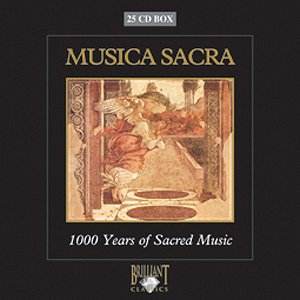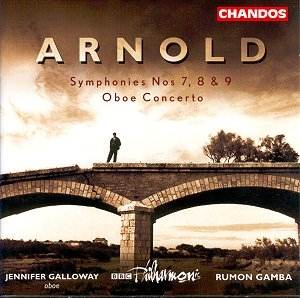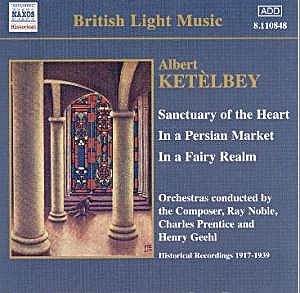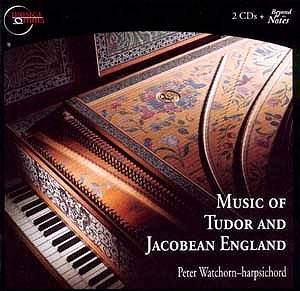 Composer: Various
Composer: Various
Works: Gregorian Chant, Hildegard von Bingen: Selected Chants, Palestrina: Stabat Mater, Tallis: Lamentations, Monteverdi: Vespers, Bach: St. Matthew Passion, Mozart: Requiem, Brahms: Ein Deutsches Requiem, Verdi: Messa da Requiem, Fauré: Requiem, Bernstein: Chichester Psalms, Pärt: Magnificat Antiphonen
Performers: Pro Cantione Antiqua, Schola der Benediktinerinnenabtei St. Hildegard Rüdesheim-Eibingen, Choir of Clare College, Cambridge, The Sixteen Choir & Orchestra, Cappella Breda, others
Recording: 25-CD set, Brilliant Classics
Label: Brilliant Classics
Brilliant Classics’ ambitious 25-CD collection, “SACRA BRILLANT,” traverses a millennium of sacred music, encapsulating an extraordinary array of styles and epochs. The set encompasses Gregorian chant, the ethereal melodies of Hildegard von Bingen, Palestrina’s polyphonic masterpieces, the grandeur of Bach and Mozart, through to the modern contemplations of Arvo Pärt and Leonard Bernstein. This mosaic of sacred works serves not only as a comprehensive anthology but also as an invitation for listeners to explore the evolution of Western sacred music.
The performances are uniformly commendable, with notable highlights emerging from each disc. The opening Gregorian chants showcase the purity of the human voice, performed with an unadorned honesty by Pro Cantione Antiqua under James O’Donnell’s direction. The clarity of the chant’s melodic lines, particularly in “Vexilla Regis prodeunt,” resonates with a spiritual urgency that transports the listener back in time. The acoustic environment, captured in the recording, enhances the ethereal quality of the music, allowing the nuances of pitch and tone to flourish.
Hildegard von Bingen’s selections, rendered by the Schola der Benediktinerinnenabtei, reveal her unique melodic language, characterized by expansive intervals and a mystical quality. The interpretation of “O frondens virgo” is particularly striking, where the choir’s blend of voices creates a lush soundscape, evoking the nature imagery prevalent in Hildegard’s texts. The engineering captures the warmth and resonance of the ensemble, making the listener feel enveloped in the music’s spiritual essence.
Palestrina’s “Stabat Mater” is an emotional centerpiece of the collection, performed with sensitivity and conviction. The countertenor Lawrence Zazzo and soprano Angharad Gruffydd Jones deliver a stirring duet that balances drama and serenity, particularly in the “Fac, ut ardeat” section, where their voices intertwine seamlessly. The recording’s clarity allows the listener to appreciate the contrapuntal intricacies, highlighting Palestrina’s mastery of vocal interplay.
Turning to the monumental works of Bach, the “St. Matthew Passion” performed by the Choir of King’s College and the Brandenburg Consort stands out as a benchmark recording. Rogers Covey-Crump’s Evangelist, while competent, does not quite reach the dramatic heights expected in this pivotal role, especially when juxtaposed with Peter Schreier’s iconic interpretations. However, Emma Kirkby’s poignant delivery in “Erbame dich” offers a moment of transcendence, showcasing her ability to convey deep emotion with clarity and artistry.
The inclusion of modern works, such as Arvo Pärt’s “Magnificat Antiphonen,” introduces a meditative contrast to the earlier pieces, illustrating the versatility of sacred music across the ages. The Cappella Breda’s performance is marked by a serene adherence to Pärt’s minimalist aesthetic, yet it risks losing some of the dynamic contrast that could elevate the listening experience further.
Remarkably, the engineering throughout the set is consistently high-quality, showcasing the subtle interplay of voices and instruments with a sense of spaciousness that feels both intimate and grand. Each work is presented with a clarity that allows the listener to discern intricate details, from the delicate overtones of early chant to the lush harmonies of later compositions.
This extensive collection is a treasure trove for both aficionados and newcomers to sacred music. While some performances may not rival the definitive recordings of yesteryear, the breadth of repertoire and the accessibility at such a low price point make it an invaluable resource. The journey through centuries of sacred expression is both enlightening and enriching, offering a profound appreciation for the enduring power of music as a vessel for the sacred.



